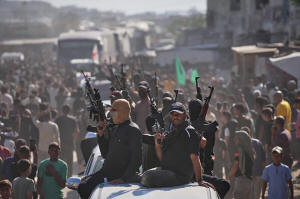Hamas reasserts control in a chaotic Gaza, posing a risk to the fragile
ceasefire
[October 15, 2025]
By SAMY MAGDY and JOSEPH KRAUSS
CAIRO (AP) — As the Gaza ceasefire holds, Hamas security forces have
returned to the streets, clashed with armed groups and killed alleged
gangsters in what the militant group says is an attempt to restore law
and order in areas where Israeli troops have withdrawn.
The show of force, welcomed by some Palestinians after months of
lawlessness, could threaten the truce now that all the living hostages
taken in Hamas' Oct. 7, 2023, attack have been released.
Israeli Prime Minister Benjamin Netanyahu has repeatedly said the war
will not end until Hamas has been dismantled, and U.S. President Donald
Trump's ceasefire plan calls for Hamas to disarm and hand power over to
an internationally supervised body that has yet to be formed.
Hamas has not fully accepted those terms, saying more negotiations are
needed. It says it is willing to hand over power to other Palestinians
but will not allow chaos to prevail during the transition. Israelis fear
that as long as Hamas is armed, it will exercise influence in Gaza — and
could rebuild its military capabilities — even if an independent body
exercises nominal rule.
Trump said Tuesday that Hamas had taken out “a couple of gangs that were
very bad,” and killed a number of gang members. “That didn't bother me
much, to be honest with you,” he said.
But he reiterated his demand for Hamas to lay down its arms, saying:
“They will disarm, and if they don’t do so, we will disarm them, and
it’ll happen quickly and perhaps violently.”
Breakdown in security
The Hamas-run police maintained a high degree of public security after
the militants seized power in Gaza 18 years ago while also cracking down
on dissent. They largely melted away in recent months as Israeli forces
seized large areas of Gaza and targeted Hamas security forces with
airstrikes.

Powerful local families and armed gangs — including some anti-Hamas
factions backed by Israel — stepped into the void. Many are accused of
hijacking humanitarian aid and selling it for profit, contributing to
Gaza's starvation crisis.
Nahed Sheheiber, head of Gaza’s private truckers union, said Hamas was
acting against gangs that had terrorized people in areas controlled by
Israel.
“Those gangs looted aid and killed people under the protection of the
(Israeli) occupation,” he told The Associated Press, saying they
operated in so-called red zones where Israel had ordered people to
evacuate. The Israeli military did not respond to a request for comment.
Over the weekend, Hamas-led fighters clashed with an armed group in Gaza
City affiliated with the powerful Doghmush family after the killing of
Mohammed Aqel, a Hamas militant, on Friday.
Aqel's family said in a statement that militiamen had kidnapped him,
robbed him and killed him. Another family, the al-Muqaid, said the gang
ambushed five of its members when they returned to their homes and
robbed them, killing one and leaving another in intensive care.
Residents of the area, who spoke on condition of anonymity out of
security concerns, said the gang, led by Hussam Doghmush, was known to
loot aid convoys and rob abandoned homes in areas controlled by the
Israeli military. They said Doghmush was among some two dozen people
killed in the clashes with Hamas, including a local journalist and a son
of a senior Hamas official based outside Gaza.

[to top of second column]
|

Hamas gunmen on pickup trucks escort buses carrying freed
Palestinian prisoners as they are greeted following their release
from Israeli jails under a cease-fire agreement between Hamas and
Israel, in Khan Younis, southern Gaza Strip, Monday, Oct. 13, 2025.
(AP Photo/Jehad Alshrafi)

Hamas-linked Telegram channels said Hamas had targeted
“collaborators and traitors” working with Israel. The Hamas-run Sahm
security force, which says it targets looters and other criminals,
shared footage that appeared to show its forces killing eight people
execution-style in the streets as people cheered. It said the
detainees were gangsters.
The Gaza-based Al Mezan Center for Human Rights and the Palestinian
Independent Commission for Human Rights denounced the extrajudicial
killings by Hamas.
The Doghmush family initially denounced the gang and distanced
itself from it. Two days later, it issued another statement
condemning Hamas' response, saying there was no need for “this
brutality.”
A first step toward normalcy
Saeed Abu Elaish, a medic from the northern Jabaliya refugee camp
who fled to central Gaza last month, said he had seen police return
to the streets and welcomed it as a first step toward restoring
“some kind of normalcy and safety” after two years of ruinous war.
Netanyahu has hinted he will resume military operations if Hamas is
not disarmed peacefully.
The Hamas-run Interior Ministry has announced a weeklong amnesty,
saying gang members not implicated in bloodshed can turn themselves
in and have their records expunged. Those who do not will face
arrest and prosecution, it said.
“No one will be allowed to undermine public security or the rights
of citizens,” the ministry said in a statement, calling it a “a
final warning.”
Hossam al-Astal, the leader of an anti-Hamas militia in southern
Gaza with apparent links to Israel, rejected the warning.
“To all the Hamas rats, your tunnels are destroyed, your rights
don’t exist anymore. Repent before it is too late — there is no
Hamas from today onward," he wrote on Facebook.

Al-Astal who was imprisoned by Hamas before the war on allegations
of drug smuggling, established an armed group late last year that
operates in areas controlled by Israel. He appears to have joined
forces with Yasser Abu Shabab, who leads a similar armed group in
the Israeli-controlled southern city of Rafah that has a history of
looting aid convoys.
Israel has acknowledged supporting Abu Shabab and others opposed to
Hamas, while denying any involvement in the looting of aid.
The presence of such groups could complicate talks over Hamas’
disarmament. The militants have expressed willingness to hand over
offensive weapons like rockets to a Palestinian or Arab body but say
they need lighter weapons like assault rifles to defend themselves,
according to Arab officials who spoke on condition of anonymity to
discuss the sensitive ceasefire talks.
___
Krauss reported from Ottawa, Ontario.
All contents © copyright 2025 Associated Press. All rights reserved |